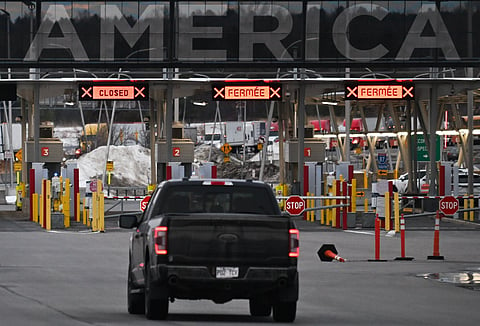Why tariffs are likely to hurt the US economy
The US needs to realise that global leadership isn’t free. It comes at a price.

Nearly six weeks into its term, Trump 2.0 is fast and tumultuous. Trade tariffs and immigration have been his priorities in setting the agenda during the second term. Tough measures like detentions, strict border controls and forced deportations to countries as far as India have brought undocumented immigration down by 90 per cent for now. However, it has already resulted in a shortage of unskilled workforce and higher labour costs in certain areas.
Trade deficit is another matter, which is due to reasons that lie within rather than in the countries sending goods. A comparable action would be to stop buying from them. But it is not as simple and easy. In 2024, the United States recorded a total trade deficit of $918.4 billion, marking a 17 per cent increase from the $784.9 billion deficit in 2023. Just three countries, China, Mexico and Canada - the three biggest US trade partners, accounted for $430.5 billion of deficit according to the US Bureau of Economic Analysis.
Repercussions of simplistic tactics
Reducing the trade deficit, President Trump thinks will protect domestic industries. But to correct the balance he has adopted simplistic tactics, which do not address the underlying causes. In addition to a host of other tariff threats, he imposed a 25 per cent tariff on steel and aluminium imports from Canada and Mexico – the friendliest of neighbours. These went into effect in early March but were paused again within days - likely in response to the clear evidence of their destructive potential for US growth, inflation and financial markets.
China gets these heavy duties and an additional 10 per cent on many goods. As expected, these tariffs triggered retaliatory measures from other countries, including the European Union, Canada, Mexico and China. These countries also imposed tariffs on American agricultural products. Canada tellingly announced that the tariffs would be targeted specifically on the products where Trump has a higher voter base.
The stock market understandably reacted with volatility. Investors are weighing the risks of an extended trade conflict. Many countries had already challenged the US decision at the World Trade Organization (WTO) arguing that the US actions violate the global trade rules. American actions raise fears that these tariffs and counter-tariffs could spark a full-scale trade war harming global economic growth. Smaller states will become particularly vulnerable.
What tariffs cannot fix
Rising from $6.45 trillion in 2000, global trade is estimated to have reached $33 trillion by the end of 2024 bringing prosperity to many countries. The cost of production has gone down. Global supply chains have made the world interdependent. The WTO-based trading system dissuades discriminatory practices, promotes transparency and predictability, and discourages governments from enacting protectionist measures. For the US the real issue isn’t foreign competition; the US is consuming more than it produces and relying on debt to sustain its lifestyle. The American worker is not as productive, committed, or cost-competitive as counterparts in Asia and elsewhere. Tariffs don’t fix that—they just mask the problem. The other reason is that the US remains mired in wars.
By implication, these measures confirm that the US is unable to compete in a free market system. America’s punitive policies will, therefore, not correct the balance of payment issues in the long run. While this protectionism has created uncertainty in global markets these policies reflect a retreat from the free-market principles the US once championed. The withdrawal will leave the field open for China, India, Europe and ASEAN to increase their market share.
Fading US influence
Trade apart, pulling out of Paris Climate Accords, World Health Organization and several other pacts seemingly makes the US an unreliable partner. Such actions will strengthen alternate trade agreements and will dent American influence in setting up trade norms.
The US is, therefore, likely to face consequences for its protectionist policies. In the short term, the American consumer will bear the brunt of higher prices due to the imposition of tariffs. Local industries and agriculture will be hit hard by retaliatory tariffs, leading to job losses. Labour costs will rise because of a clampdown on immigration, particularly from Latin America.
The price of leadership
The US needs to realise that global leadership isn’t free. It comes at a price. It requires economic strength, credibility, and the ability to set rules that others follow. In addition, great powers also need to demonstrate benevolence towards the less privileged. The US, by pursuing isolationist and protectionist policies, is not only hurting its own economy but also accelerating the rise of other economic centres like China, India, ASEAN, and the EU. Erraticism in the conduct of foreign relations leads to a loss of moral authority.
America needs to learn a lesson from former British Prime Minister Margret Thatcher’s playbook - a nation must manage its finances like a household. If you keep borrowing to sustain a lifestyle beyond your means, there will be deficits and borrowings, which have already led to an unsustainable debt of over $36.22 trillion on February 28, 2025.
Global power without global responsibility does not work. Historically, great powers that extract benefits without maintaining alliances and rules lose their influence. America’s future, like all the great powers in history, will only be determined by the choices it makes.
Sajjad Ashraf served as an adjunct professor at the Lee Kuan Yew School of Public Policy, National University of Singapore from 2008 to 2017. He was a member of the Pakistan Foreign Service from 1973 to 2008 and served as an ambassador to several countries.



